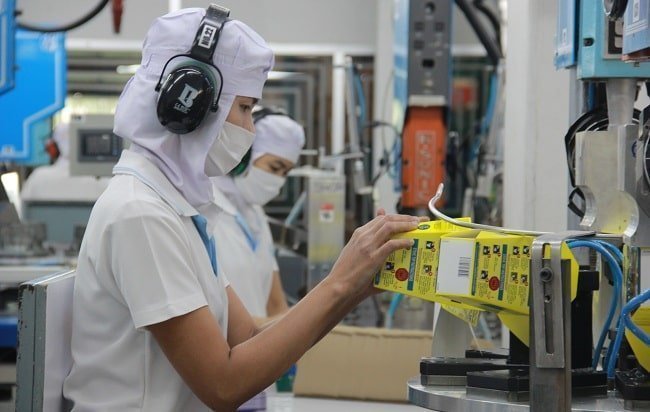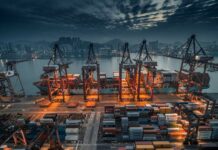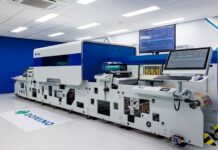Thailand’s printing and packaging industries registered over 300 billion Baht in 2018 of which 40 percent came from the printing industry and 60 percent from packaging. This year is looking to post positive and optimistic outlooks led by 3 supporting growth industries – Food and Beverage, Pharmaceuticals and Cosmetics, and e-Commerce.
A tripartite collaboration between Messe Düsseldorf Asia, The Thai Packaging Association and The Thai Printing Association, PACK PRINT INTERNATIONAL is a must-visit exhibition for the packaging and printing industries. The 7th edition will showcase 300 leading companies from 25 countries and will take place from 18-21 September 2019 at BITEC, Bangkok.
Ms Beattrice J. Ho, Project Director of PACK PRINT INTERNATIONAL 2019, Messe Düsseldorf Asia, stated that these megatrends have created a considerable amount of industrial value, as printing and packaging capabilities are integral to a diverse mix of application industries. In tandem with global shifts and movements, these macro-level factors supporting printing and packaging businesses are:
1. Digital packaging: A printing industry growth area – According to Smithers Pira’s The Future of Digital Print for Packaging to 2022 report, the rapidly expanding digital (inkjet and toner) packaging market will grow by almost 13% annually to exceed US$22.0 billion by 2022. Very strong growth will be seen in corrugated, carton, flexibles and direct-to shape, with developments in metal printing. This is especially since digital print platforms are opening up a whole world of possibilities for boosting emotional engagement with a consumer and creating new revenue streams.

2. Print technology investment– Taking cue from the 6th drupa global trends report released in April 2019 – which surveyed 620 printers from around the world, the leading print technology investment plans by market in 2019 are: Commercial (digital toner cutsheet colour: 29%, digital inkjet wide format – cutsheet and rolled: 19%), Packaging (sheetfed offset: 27%, Flexo: 25%), Functional (digital toner cutsheet colour: 27%, digital inkjet wide format – cutsheet and rolled: 23%) and Publishing (digital toner cutsheet colour: 30%, sheetfed offset: 29%). In gist, print can be optimistic about the future, where printers and suppliers can look to new ways to exploit emerging technologies so as to place print as a central tool for consumers.
3. Technologies and innovations that create industrial value – One such instance is the shift to meet increasing demands for personalisation and customisation, manufacturers and printers of all types are creating solutions that make this growing market possible, namely faster, higher quality, more affordable digital printing technology. Last year was a tipping point for the packaging industry. Narrow-web digital presses exceeded the standard flexo presses for the first time. 2018 was the first year digital presses emerged the packaging industry’s leading choice. A marketing research study by LPC, Inc. into the label-making segment found digital presses grew by 11.9 percent in 2017 – proof of a major trend change in the packaging industry.
Led by modernism and changes in consumer behavior focused on personalisation, convenience and smart packaging, and the advent of online sales, a bright spot comes in the form of the print packaging market which is on a steady growth to reach US$286 billion in 2020. In Asia-Pacific, the market is currently the largest regional print packaging market, accounting for over 42% of revenues, and is expected to become the second fastestgrowing region through to 2020. This bodes well with the trend in Asia – where it would represent over 40% of global packaging demand come 2022.
Ms Ho’s projected outlook was echoed by Mr Manit Kamolsuwan, President of The Thai Packaging Association and Mr Phongthira Pattanapiradej, President of The Thai Printing Association. According to Mr Manit, Thailand’s packaging industry had a domestic production capacity of 5.83 million tons in 2018. In terms of raw materials used, the highest growth was observed in paper (37.74 percent), followed by glass (30.05 percent), plastic (24.34 percent), and metal (7.87 percent). It is also expected that the industry would continue its upward cycle in light of governmental policies to stimulate investment.

In response to the national policy of promoting Thailand as a manufacturing centre, he also added that Thailand’s Food & Beverages sector remains the key growth driver for the packaging industry and is buoyed by export demand and easy access to raw materials. Coupled with active and smart packaging as innovative solutions to preserve food quality and to extend the shelf life of food, alongside the Thai government’s series of national standards relating to food packaging and labelling, are all designed to meet international standards.
Commenting on how availability of innovation and technology would up the competitiveness of the Thai packaging industry on an international level, Mr Manit said, “Over the next decade, the packaging industry will witness a significant revolution as the applications of digital printing increases. Therefore, it is important for local businesses to align themselves with the global digital packaging printing market – in coming out with attractive, cost-efficient and sustainable products for an increasingly crowded and competitive marketplace”.
Conversely, the Printing industry in Thailand is worth more than US$3.7 billion today, with the paper packaging industry alone exceeding US$5.7 billion according to Mr Phongthira. This trend will continue to grow on the back of Thailand’s attractiveness as a printing- products investment location as its surrounding region forms the ASEAN Economic Community, a single market of some 600 million consumers.
Demand for package printing is also expected to increase as both domestic and export markets for products of all types, particularly processed food, pharmaceuticals and cosmetics, and e-commerce will expand. Supporting this demand are Thailand’s excellent manufacturing facilities such as the 144-hectare Sinsakhon Printing City and Industrial Estate. The world’s first full-service industrial park for the printing and packaging industry, which houses manufacturers from every phase of the printing process – from pre-press and printing to post-press, packaging and fulfillment, provides an all-in-one use of resources and reduction in manufacturing costs, allowing companies to produce a wider variety of high-quality goods at competitive prices.
When asked about opportunities for growth and investment in the paper and printing industry in Thailand, Mr Phongthira encouraged businesses to look towards, “high-quality, high-fidelity printing, hybrid printing, automation processes and ‘smart factory’ set-up in line with “Packaging 4.0”, as well as customisation in digital printing and environmentally friendly, affordable packaging”. He added that this is in light of favourable factors that make Thailand an ideal base for operations including the country’s high-volume pulp production and supply of paper, enhanced infrastructure in the form of Sinsakhon Printing City, workforce availability and strong government support; including tax and non-tax incentives for projects that meet national development objectives by the Thailand Board of Investment (BOI).
An exhibition for the industry, by the industry
With its 2019 theme, Shaping the future of packaging and printing in Asia, the exhibition driven by sectors’ leading trade fairs drupa and interpack by the Messe Düsseldorf Group in Germany, will see global packaging and printing innovations put up by over 300 leading companies from 25 countries, including national groups from Germany, Taiwan, Singapore, Thailand, China and Singapore and a leading line-up of brands made up: HP, Heidelberg, Konica Minolta, Riso, Fujifilm, Ricoh, Bobst, KURZ, Zund, Duplo, Sansin, Selic Corp, PMC label materials and more.
Addressing forward-looking industry trends and movements, the 7th edition of the International Packaging and Printing Exhibition for Asia, will spotlight on 4 thematic zones, i.e. One-Stop Pack & Print Pavilion, Labelling Zone, Logistics & Automation Zone and a dedicated Prototype Showcase, in parallel with a series of industry-focused conferences and forums.
The 4-day exhibition will also zoom into areas such as package printing, corrugated printing and packaging, digital printing, electronic printing, large format printing, flexible packaging and robotics. As well as extend its reach to visitors coming from a broad range of industries and diverse application areas, including print and packaging houses and converters, marketing, publishing and media sectors, vertical markets and those in the future technologies industry.
As Southeast Asia’s largest Packaging and Printing exhibition, the exhibition’s international and diverse exhibitor and visitor base reinforces its position as the main focal point for suppliers and buyers to gain greater business prospects, and the inroads for businesses
and entrepreneurs from the Thai printing and packaging industry to network, gain insights and conduct successful business transactions in the international marketplace.
For more information, visit www.pack-print.de
About Messe Düsseldorf Asia
As a full-service trade fair organising company, Messe Düsseldorf Asia offers a comprehensive international trade fair portfolio focusing on machinery and plant engineering, to medicine and health. Having established Singapore as the centre of operations in 1995, MDA is well-positioned in Southeast Asia and is today one of the leading and most influential trade fair organisers in the region. MDA is focused on providing an effective platform for trade, as well as providing access to and exchange of knowledge and networking opportunities. Through its progressive and synergistic approach, MDA is able to develop and create innovative themes in paving new directions to navigate pathways and opportunities in trade and investments in the vast and promising Southeast Asian landscape.




























